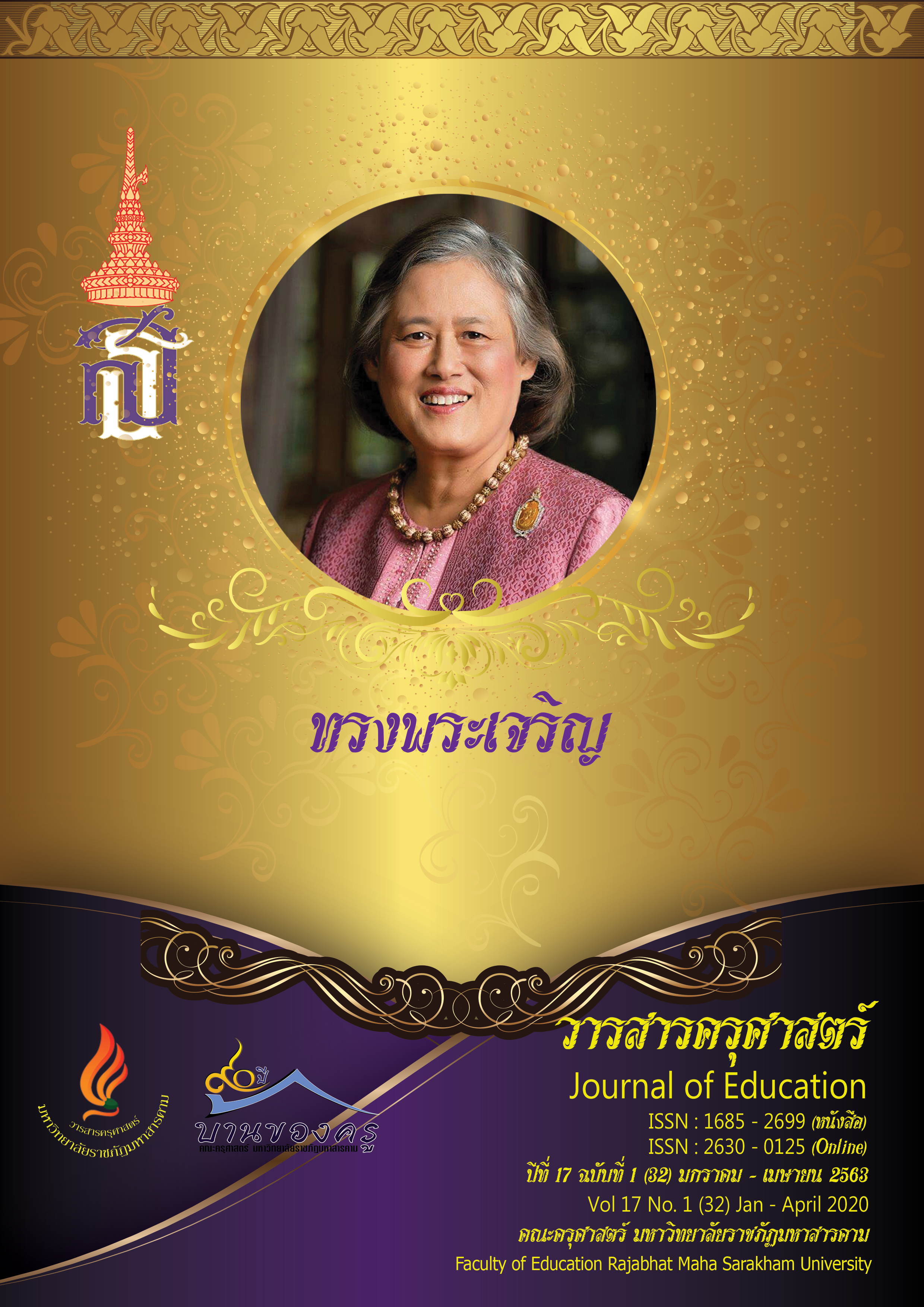The Strengthening Key Characteristics of Teacher in Love and Faithfulness for Teaching Professional at Rajabhat Maha Sarakham University
Main Article Content
Abstract
The purposes of this research were 1. to analyze, synthesize guidelines for strengthening
key characteristics of professional teachers in their love and faithfulness 2. Developing the strengthening
key characteristic activities and 3. Trial and evaluation of satisfaction in the strengthening key characteristic
activities and the research tools for this study are interview questions and activity manuals.
The sample group used in this study were consisted of 1) a group of 10 experts 2) an experimental
group consisting of 20 first year students who were volunteered. Data analysis using of frequency,
percentage, mean, standard deviation and content analysis.
The research revealed that: 1) The activities aspect of love and Faithfulness for teaching
professionals including (1) Using religious and psychological methods (2) Organize classroom activities,
(3) Use learning from real situations and learn from models, (4) Use the open forum and (5) Organize
camp designs, programs, and training according to the curriculum. 2) The results of activities consisted
of 2 main activities and 7 sub-activities and the appropriateness of the activities was at a high level
with an average of 4.46 standard deviations at 0.49 and 3) The results of the trial and evaluation of
activity satisfaction found that the students who participated in the activities have self-awareness
as good teachers and were satisfied with the activities for strengthening key characteristics of
professional teachers in love and faithfulness at a high level ( = 4.42, S.D. = 0.58).
Article Details
ข้อกำหนดเบื้องต้นที่ผู้นิพนธ์(ผู้ส่งบทความ) ควรทราบ
1. ผู้นิพนธ์ที่ประสงค์จะลงตีพิมพ์บทความกับวารสาร ตั้งแต่เดือนมกราคม 2563 เป็นต้นไป ให้ใช้รูปแบบใหม่ (Template 2563) โดยสามารถดูตัวอย่างได้ที่เมนู GUIDELINES
2. จะตีพิมพ์และเผยแพร่ได้ ต้องผ่านการประเมินจากผู้ทรงคุณวุฒิ (Peer Review)
3. การประเมินบทความโดยผู้ทรงคุณวุฒิ (Peer Review) เป็นแบบ Double Blind
4. การอ้างอิงบทความใช้หลักเกณฑ์ APA (American Psychological Association) คลิก
5. บทความถูกปฏิเสธการตีพิมพ์ ไม่ผ่านการประเมิน ผู้นิพนธ์ขอยกเลิกเองหรือชำระเงินก่อนได้รับการอนุมัติ ทางวารสารไม่มีนโยบายการคืนเงิน
References
ดุจเดือน พันธุมนาวิน. (2551). การสังเคราะห์งานวิจัยเกี่ยวกับคุณธรรมจริยธรรมในประเทศไทยและต่างประเทศ.กรุงเทพมหานคร: บริษัทพริกหวานกราฟฟิค จำกัด.
ธรรมนันทิกา แจ้งสว่าง (2555). ประสบการณ์ของความเป็นครูผู้มีจิตวิญญาณความเป็นครู: การศึกษาเชิงปรากฏการณ์วิทยา. วารสารพฤติกรรมศาสตร์, 18(1), 55-65.
ปัทมา เวียงวุธ. (2556). ผลของการใช้กิจกรรมกลุ่มเพื่อส่งเสริมพฤติกรรมทางสังคมของนักเรียนออทิสติก(วิทยานิพนธ์ปริญญาศึกษาศาสตรมหาบัณฑิต ไม่ได้ตีพิมพ์). มหาวิทยาลัยศิลปกร, นครปฐม.
ปิยะพล ทรงอาจ. (2560). การเปลี่ยนแปลงพฤติกรรมตามแบบจำลองข้ามทฤษฎี. วารสารวิทยาลัยบัณฑิตเอเชีย,7(พิเศษ), 221.
พระธรรมปิฎก (ป.อ.ปยุตฺโต). (2538). การพัฒนาจริยธรรม. กรุงเทพมหานคร: มูลนิธิพุทธธรรม.
พระสุขุม สุขวฑฒโก. (2559). ลักษณะของครูที่ดี. วารสารศึกษาศาสตร์ มหาวิทยาลัยมหามกุฏราชวิทยาลัย, 4(1),31-40.
ภาสกร เรืองรองและคณะ. (2557). เทคโนโลยีการศึกษากับครูไทยในศตวรรษที่ 21. วารสารปัญญาภิวัฒน์,5(ฉบับพิเศษ), 195 – 204.
มลิวัลย์ สมศักดิ์ และคณะ. (2561). องค์ประกอบและตัวชี้วัดจิตวิญญาณความเป็นครูของนักศึกษา คณะครุศาสตร์
มหาวิทยาลัยราชภัฏ. Journal of Southern Technology, 11(1), 51 – 57.
มารุต พัฒผล. (2558). รูปแบบการพัฒนาครูประถมศึกษาด้านการโค้ชเพื่อให้รู้คิด. วารสารมหาวิทยาลัยศิลปากร,8(2), 593-612.
สจีวรรณ ทรรพวสุ. (2559). กลยุทธ์การพัฒนาจิตวิญญาณความเป็นครูเพื่อส่งเสริมความเป็นครู วิชาชีพของนักศึกษาคณะครุศาสตร์ มหาวิทยาลัยราชภัฏสวนสุนันทา. วารสารราชพฤกษ์ มหาวิทยาลัยราชภัฏนครราชสีมา,15(1), 1 – 9.
สมโภชน์ เอี่ยมสุภาษิต. (2556). ทฤษฎีและเทคนิคการปรับพฤติกรรม (พิมพ์ครั้งที่ 8). กรุงเทพมหานคร:สำนักพิมพ์แห่งจุฬาลงกรณ์มหาวิทยาลัย.
สำนักงานเลขาธิการคุรุสภา. (2554). ข้อบังคับคุรุสภาว่า ด้วยมาตรฐานวิชาชีพและจรรยาบรรณของวิชาชีพ(ฉบับที่ 2) พ.ศ. 2554. กรุงเทพมหานคร: เจริญผล กราฟฟิค.
สำนักงานเลขาธิการสภาการศึกษา. (2555). การประชุมทางวิชาการการวิจัยทางการศึกษาระดับชาติ ครั้งที่ 14.กรุงเทพมหานคร: เจริญผล กราฟฟิค.
สุทัศน์ เอกา. (2558). ครูแห่งศตวรรษที่ 21. กรุงเทพมหานคร: บริษัท ก.พล (1996) จำกัด.
Chong, S., Low, E. L., and Goh, K. C. (2011). Developing student teachers’ professional identitiesan exploratory study. International Education Studies, 1(4), 30–38.
Conti, S., and Patrick, D. (2002). The spiritual life of teacher: A study of holistic education and the holistic perspective (Unpublished doctoral dissertation of psychology and education).Columbia University, New York: United States.
Graham, A., and Phelps, R. (2003). Being a teacher: developing teacher identity and enhancing practice through metacognitive and reflective learning processes. Australian Journal of Teacher Education, 27(2), 11–24.
Jana., H. (2010). Characteristics of effective professional development: A checklist (Research report). Department of Teacher Education Bradley University. Retrieved from:https://eric.ed.gov/?id=ED510366
Janesawang, T. (2011). Teacher spirituality experience: A phenomenological study (Unpublished doctoral dissertation). Srinakarinwirot University, Bangkok, Thailand.
Katz, L. G. (1972). Development stages of preschool teachers. ERIC Document Reproduction Service No. ED057922, pp.11. Retrieved from https://eric.ed.gov/?id=ED057922


